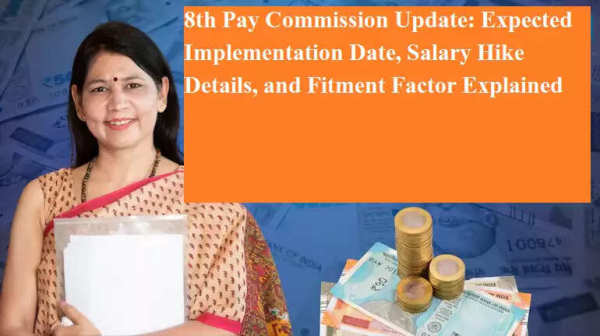
Millions of central government employees and pensioners in India are eagerly awaiting the implementation of the 8th Pay Commission. With rising inflation and a growing cost of living, hopes are high that the new pay structure will bring significant financial relief and boost disposable income. Here’s a detailed look at when the 8th Pay Commission might be implemented, how much salary hike employees can expect, and the projected fitment factor.
The 8th Pay Commission is a government-appointed body responsible for revising the salary structure, allowances, and pension of central government employees and retirees. The previous (7th) Pay Commission came into effect in 2016, and now, after nearly a decade, expectations are building around the next big update in government pay scales.
The official announcement of the 8th Pay Commission was made in January 2025. However, the formal appointments of the Chairperson, commission members, and the definition of the Terms of Reference (ToR) are still pending.
According to a report by Ambit Institutional Equities, the recommendations of the 8th Pay Commission may be submitted by the end of 2025, and the new pay structure is likely to be implemented from January 2026. The final implementation will depend on government approval after the report is submitted.
If the Pay Commission’s recommendations are implemented in FY27 (Financial Year 2026–27), employees and pensioners may receive a salary and pension hike of 30% to 34%, based on early estimates.
This hike would be a significant financial boost and is expected to improve not only employee welfare but also consumer spending, further stimulating the economy.
The fitment factor is a crucial component in salary revision. It acts as a multiplier used to recalculate the basic salary of an employee under the new pay commission.
Expected Fitment Factor Range: Experts predict the fitment factor may fall between 1.83 and 2.46.
For example, if an employee’s current basic pay is ₹18,000 and the fitment factor is fixed at 2.0, the revised basic salary would become ₹36,000.
It’s important to note that this does not include allowances like Dearness Allowance (DA) and House Rent Allowance (HRA), which further increase the take-home salary.
According to Ambit Capital’s analysis, this projected range is in line with historical trends observed in earlier pay commissions.
The implementation of the 8th Pay Commission is not just a financial reform for government employees but also a strategic economic move. A substantial salary hike can:
Boost consumer spending,
Increase demand across sectors,
Provide momentum to a demand-driven economy,
Support broader economic growth.
Once the Terms of Reference are finalized and the commission is officially constituted, the following steps will take place:
Formation of panels and initiation of the consultation process.
Submission of the recommendation report by end of 2025.
Approval by the Union Cabinet.
Implementation of the revised pay structure from FY27, likely beginning in January 2026.
The 8th Pay Commission holds significant importance for over 10 million central government employees and pensioners. While the official rollout is still in the pipeline, expectations are high that it will bring substantial financial relief. With the projected fitment factor between 1.83 and 2.46, employees could see their salaries increase by up to one-third, making a meaningful difference to their financial planning.
Keep an eye on official updates as the commission takes shape, and prepare for the changes that could redefine the future of public sector compensation in India.